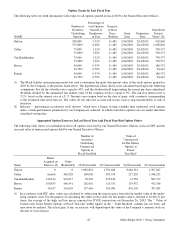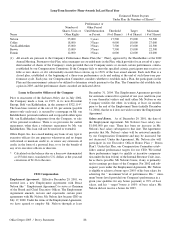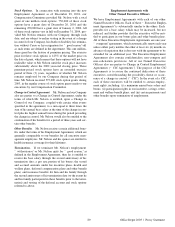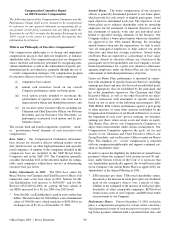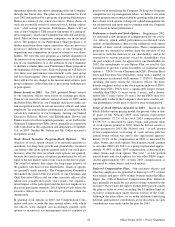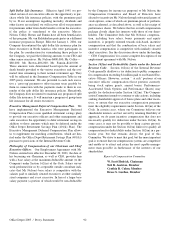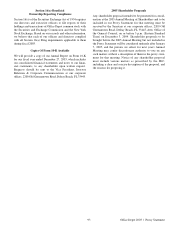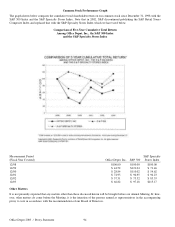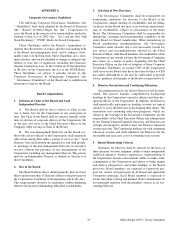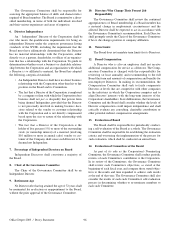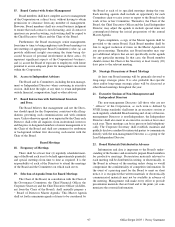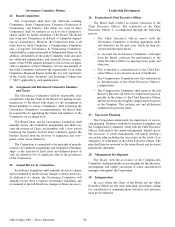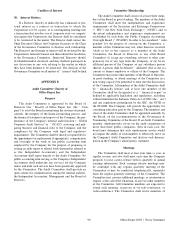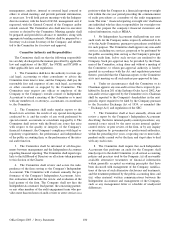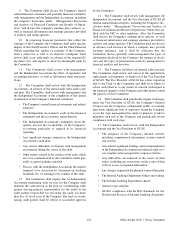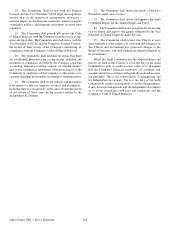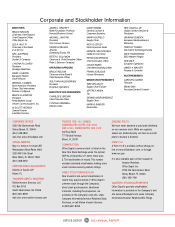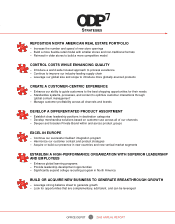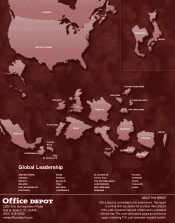Office Depot 2003 Annual Report Download - page 99
Download and view the complete annual report
Please find page 99 of the 2003 Office Depot annual report below. You can navigate through the pages in the report by either clicking on the pages listed below, or by using the keyword search tool below to find specific information within the annual report.97 Office Depot 2003 / Proxy Statement
15. Board Contact with Senior Management
Board members shall have complete access to management
of the Corporation on a direct basis, without having to obtain
permission or clearance from any member of management.
However, Board members shall use sound business judgment
to ensure that such contact is not distracting, and, if contact or
questions are posed in writing, such writing shall be copied to
the Chief Executive Officer and the Chair of the Board.
Furthermore, the Board encourages senior management,
from time to time, to bring employees into Board meetings (or
into meetings of appropriate Board Committees) who: (a) can
provide additional insight concerning the items being dis-
cussed because of personal involvement in these areas; (b)
represent significant aspects of the Corporation’s business;
and (c) assure the Board of exposure to employees with future
potential to assure adequate plans for management succession
within the Corporation.
16. Access to Independent Advisors
The Board and its Committees, including the non-manage-
ment or Independent Directors when convening in executive
session, shall have the right, at any time, to retain independent
outside financial, compensation, legal or other advisors.
17. Board Interaction with Institutional Investors
and Press
The Board believes that management and not the Direc-
tors should speak for the Corporation, consistent with all reg-
ulations governing such communications and with common
sense. Unless otherwise agreed to or requested by the Chair, each
Director shall refer all inquiries from institutional investors
and the press to designated members of senior management or to
the Chair of the Board and shall not comment for attribution
or background without first discussing such matter with the
Chair of the Board.
Board Meetings
18. Frequency of Meetings
There shall be at least four (4) regularly scheduled meet-
ings of the Board each year (to be held approximately quarterly)
and special meetings from time to time as required. It is the
responsibility of each of the Directors to attend the meetings
of the Board and the Committees on which each serves.
19. Selection of Agenda Items for Board Meetings
The Chair of the Board, in consultation with the Chair of
the Governance Committee, the Chief Financial Officer, the
Corporate Secretary and the Chief Executive Officer (if differ-
ent from the Chair of the Board), shall annually prepare a
“ Board of Directors Master Agenda.” This Master Agenda
shall set forth a minimum agenda of items to be considered by
the Board at each of its specified meetings during the year.
Each meeting agenda shall include an opportunity for each
Committee chair to raise issues or report to the Board on the
work of his or her Committee. Thereafter, the Chair of the
Board, the Chief Executive Officer and the Lead Independent
Director, may adjust the agenda to include special items not
contemplated during the initial preparation of the annual
Master Agenda.
Upon completion, a copy of the Master Agenda shall be
provided to the entire Board. Each Board member shall be
free to suggest inclusion of items on the Master Agenda for
any given meeting. Thereafter, any Board member may sug-
gest additional subjects that are not specifically on the agenda
for any particular meeting. In that case, the Board member
should contact the Chair or the Secretary at least twenty (20)
days prior to the relevant meeting.
20. Strategic Discussions at Board Meetings
At least one Board meeting will be primarily devoted to
long-range strategic plans. It is also probable that specific
short and/or long-range strategic plans will be discussed at
other Board meetings throughout the year.
21. Executive Sessions of Non-Management and
Independent Directors
The non-management Directors (all those who are not
“ officers” of the Corporation, as such term is defined by
NYSE listing standards) shall meet in an executive session at
each regularly scheduled Board meeting and, if any of the non-
management Directors is non-Independent, the Independent
Directors shall also meet in an executive session at least once
each year. These meetings can be in person or held telephoni-
cally. The Corporate Secretary shall establish, maintain and
publicly disclose a method for interested parties to communicate
directly with the non-management Directors as a group or the
Lead Independent Director.
22. Board Materials Distributed in Advance
Information and data is important to the Board’s under-
standing of the business and essential to prepare Board members
for productive meetings. Presentation materials relevant to
each meeting will be distributed in writing, or electronically, to
the Board in advance of the meeting unless doing so would
compromise the confidentiality of competitive information. In
the event of a pressing need for the Board to meet on short
notice, it is recognized that written materials or electronically
communicated materials may not be available in advance of
the meeting. Management will make every effort to provide
presentation materials that are brief and to the point, yet com-
municate the essential information.


